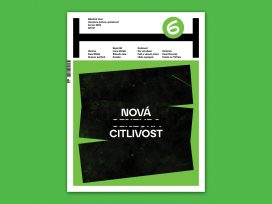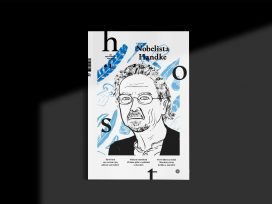Abstracts for Host 9/2006
German is still a mysterious tongue of my childhood… Interview with the poet Radek Fridrich
Those who were able to see the documentary God’s Stonepit by Bretislav Rychlik, which dealt with the reality of Northern Bohemia, remember the poet who rides around run-down German graveyards and writes down the inscriptions on the tombstones. Radek Fridrich, however, is not a quirky figure. He is one of the most gifted authors of the younger poetic generation and, poetry apart, he teaches literature at the University of Usti nad Labem. But he is a dual person in other aspects as well. On his father’s side, he comes from a Sudetenland German family and the search for identity while confronting Czech and German elements is a frequent theme of his poems.
Jiri Travnicek
A lyricist in the field of epics, or Depth without surface (Pavel Kolmacka: Footprints leading behind the skyline)
“[…] While talking with a Polish bohemian about contemporary Czech fiction, I asked him to identify its essential feature. Reliance on personal testimony, he said. The primacy of autobigraphical confession. There is something to this. Where do Czech writers, especially the young and younger ones, find their conviction that precisely their lives and various autobiographical feelings are what they should inundate us with? […] This also applies to Kolmacka’s novel. However, the author tried to flee from the confessional temptation of the first person and take refuge in the third person. It was a vain effort, the result is the same. What’s more, Kolmacka’s novel shows another defect of contemporary writing: aestheticizing of banality, i.e. when I have nothing to say, I have to say it in a most ‘artistic’ way. Another defect to mention, one which also affects Kolmacka’s novel (and a lot of today’s writing as well): lack of craft. As if the fact that they write in an ‘artistic’ way automatically sends the authors to the highest levels of fiction; and here the issues of fabulation, storytelling, and character composition are not dealt with any longer. […]”
Clients of a secondhand bookshop really differ from those of common bookshops… Interview with Petr Bouda
Secondhand bookshops are important nodal points in the cultural network. Something between a regular bookshop and an estaminet. Before the 1989 revolution, they were also centres of the cultural “grey zone”, i.e. places where what was expelled from the libraries in the early 1970s could possibly be dug up. And today? Aren’t secondhand bookshops losing their importance a bit? And is it possible to determine their new role? The Brno-based secondhand bookseller Petr Bouda seems to be the most appropriate person to answer these kinds of questions: his career stretches back to the 1970s and now he operates one of the most important secondhand bookshops in Moravia.
Published 17 November 2006
Original in Czech
Contributed by Host © Host Eurozine
PDF/PRINTNewsletter
Subscribe to know what’s worth thinking about.



